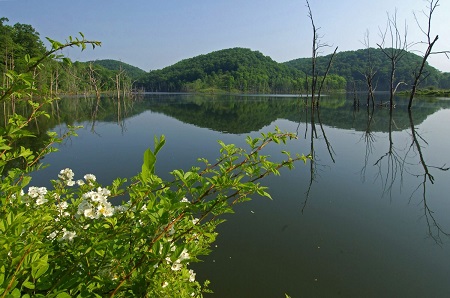 Two Weeks ago, The Conservation Fund announced its purchase of 18,778 acres of forestland—an important step toward significantly increasing public access for hunting and wildlife-associated recreation in northwestern West Virginia, while benefiting threatened and endangered species. Acquired by the Fund at the request of the West Virginia Division of Natural Resources (WVDNR), the lands will eventually be transferred to the state as funding becomes available, enabling the future creation of five new West Virginia Wildlife Management Areas (WMA) and the expansion of four existing WMAs and the North Bend State Park.
Two Weeks ago, The Conservation Fund announced its purchase of 18,778 acres of forestland—an important step toward significantly increasing public access for hunting and wildlife-associated recreation in northwestern West Virginia, while benefiting threatened and endangered species. Acquired by the Fund at the request of the West Virginia Division of Natural Resources (WVDNR), the lands will eventually be transferred to the state as funding becomes available, enabling the future creation of five new West Virginia Wildlife Management Areas (WMA) and the expansion of four existing WMAs and the North Bend State Park.
“We’re proud to partner with the WVDNR in this ongoing effort to conserve important wildlife habitat and permanently protect these lands as new and expanded WMAs and a State Park addition, which will deliver both economic and environmental benefits for local communities in an area of the state lacking in public lands,” said Joe Hankins, Vice President for The Conservation Fund. “Endeavors like this wouldn’t be possible without a long-term vision for public access and conservation, as well as creativity, good timing and collaborations between state, federal and private partners.”
The Conservation Fund purchased the lands in Wirt, Wood, Jackson, Calhoun, Pleasants, Ritchie and Doddridge Counties through its Working Forest Fund® program from The Forestland Group. Under The Conservation Fund’s temporary ownership, the property will be sustainably managed as working forestland, consistent with the WVDNR’s wildlife habitat management needs. The nonprofit organization expects to convey the land to the WVDNR in phases, starting in the winter of 2019, with funding from the U.S. Fish and Wildlife Service’s Pittman-Robertson Wildlife Restoration program and other sources. Public hunting access will be permitted once the lands are transferred to the State.
“Working collaboratively and in partnership with The Conservation Fund, Governor Justice, local communities and the energy sector, the West Virginia Division of Natural Resources now has the opportunity to expand its public land base and provide enhanced opportunities for wildlife-associated recreation,” said WVDNR Director Stephen McDaniel. “These lands will be managed to enhance essential wildlife habitat for a variety of forestland species. Hunters, anglers and others interested in wildlife will directly benefit from these conservation efforts.”
The acquired lands feature interior woodland habitat and intact forested watersheds that provide essential habitat for a variety of endangered and threatened bird, bat and mussel species. This conservation effort is complimented by the WVDNR’s recent acquisition of 12,440 acres in Jackson, Pleasants, Ritchie and Wirt Counties made possible, in part, by funding and technical assistance made available for habitat impacts anticipated to arise through construction of the Mountaineer XPress Project, the Atlantic Coast Pipeline, and the Supply Header Project in partnership with the WVDNR and The Conservation Fund.
This future establishment of new and expanded WMAs in northwestern West Virginia will be made possible with funding from the congressionally authorized Wildlife Restoration Program.
“This acquisition is an excellent step to increase public access in the most wild and wonderful areas in our beautiful state,” said U.S. Senator Joe Manchin. As a lifelong hunter and outdoor recreation enthusiast, I am proud of the work being done to protect our special areas and promote wildlife so we can pass our heritage to future generations. I thank The Conservation Fund and the WVDNR for their work.”
“Part of what makes West Virginia wild and wonderful is our amazing outdoors. From hunting and fishing to outdoor recreation, West Virginia has been blessed with beautiful natural surroundings,” said U.S. Senator Shelley Moore Capito. “It’s our responsibility to be responsible stewards of this land. I applaud this public-private partnership and applaud The Conservation Fund’s efforts to encourage sustainability and conservation in coordination with the West Virginia Department of Natural Resources.”
“West Virginia is blessed with a beautiful landscape of mountains, valleys and rivers that make it a top destination for outdoor enthusiasts and sportsmen,” said U.S. Rep. Alex Mooney (WV-02). “I am glad to see our state working with local communities and conservation groups to ensure land is preserved for future generations.”
This ongoing effort and the recent 32,000-acre conservation acquisition that created the state’s largest, conserved block of prime habitat for elk restoration in southern West Virginia would not have been possible without a strong partnership between the WVDNR, with The Conservation Fund, the U.S. Fish and Wildlife Service and many other conservation organizations and entities.
When the Wildlife Restoration Program was created 80 years ago, it became known as the Pittman–Robertson Act for its sponsors, U.S. Senator Key Pittman of Nevada and U.S. Representative Absalom Willis Robertson of Virginia. The Act allowed for money from a pre-existing federal tax on firearms and ammunition to be distributed to the States and territories for the management and restoration of wildlife.
About The Conservation Fund
At The Conservation Fund, we make conservation work for America. By creating solutions that make environmental and economic sense, we are redefining conservation to demonstrate its essential role in our future prosperity. Top-ranked for efficiency and effectiveness, we have worked in all 50 states since 1985 to protect more than eight million acres of land, including more than 85,000 acres of important natural resources, wildlife habitat and recreational lands in West Virginia at iconic places like Cheat Canyon and Canaan Valley National Wildlife Refuge, which supports local economies and businesses. www.conservationfund.org
Contact: Ann Simonelli, 703-908-5809, asimonelli@conservationfund.org
